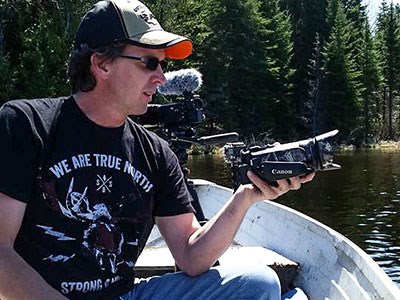Marc McNay is living the dream.
The fledgling Dryden-based television producer is set to air the second season of his outdoor show on Wild TV with a screening party in his hometown.
A welder by trade, the chance to finally host his own show was the fulfilment of a life-long ambition for McNay, who spent 10 years at the Dryden pulp mill before taking a buyout.
“Five, six years ago, when I started filming in the field with smartphones, I kept thinking, there are ways I can do this better.”
Participating in a Wild TV reality show, The Search, gave him the opportunity to showcase his talent.
Together with his former on-air partner, Denise Dubose, the self-effacing entrepreneur competed against other teams by submitting video footage of their hunts.
The pair didn’t win the grand prize of having their own show, but an industry insider liked McNay’s style and made some calls on his behalf.
“Any reality show is going to have bickering and fighting and I told Denise, let’s just do our thing, do what we do best, and see where it plays out.”
And unlike the hyper-caffeinated hosts on other outdoor shows, McNay wanted his show to be more relatable to viewers.
“We not superstars, rock stars, we’re not outdoor celebrities. We’re the guys and girls next door, the weekend warriors. What we do, anybody can do.”
Episodes will air on Wild TV four times a week for six months beginning in July.
South of the border, he’ll appear on the Hunt Channel, Amazon Fire, Roku and other digital platforms.
Locals in Dryden received a sneak peek of the debut episode of the new season at a public screening at The Centre on June 25.
Last year’s event for his inaugural season was a sold-out affair.
“It’s a big fundraiser, a big party and big thank you for my sponsors and partners and community,” said McNay.
The screening serves as an actual crowdfunding campaign.
With $50,000 to $60,000 in annual expenses, all the proceeds are funnelled back into the production.
McNay explained it’s a pricey endeavour to produce a season of 13 episodes.
“Air time is very expensive for outdoors TV. On regular TV, they’ll pay you to air on their network. On outdoors TV, we actually have to buy the air time.”
Early on, Wild TV suggested he budget $40,000 for one season’s worth of shows.
“I was able to accomplish that for less than that because I didn’t have the money,” he said. But the costs keep escalating.
His title sponsor is Indian Point Camp in Dryden, while other sponsors like Arctic Shield outdoor clothing company outfit him for the field.
When not shooting video by himself in the field, McNay recruits family and friends for his production team to employ multiple cameras on his hunts for bear, deer and moose.
Before the show began, his only experience in production was being a connoisseur of hunting shows.
“As funny as it is, that helped me tremendously because there are certain show styles I like and there are certain shows that are – let’s just say – not real.”
The inauthenticity of some shows with staged scenes “got my hackles up.”
McNay said it’s important, conceptually, that each episode be story-driven, the way it plays out in the field, as the show’s name implies.
“We don’t stage any scenes. If you see a close-up of someone pulling a trigger during a hunt there’s a fourth or fifth camera pointed at that person, just to use that two or three-second scene.
“Anybody can go out and film a harvest or a kill scene, but having a storyline behind it is very important.”
Using Canon cameras and Premiere Pro software, McNay spends more than 100 hours in the field and at home editing video footage into a 22-minute episode.
Most of his filming is done in northwestern Ontario.
“We have such an incredible little piece of the country and it doesn’t get showcased the way it should.”
McNay is hoping to tap into some tourism funding to defray his expenses, and he’s making some moves to bring two hunting-related products to market.
While looking to air on a larger outdoor channel in U.S., he’s also in discussions with some national sponsors.
“The national sponsorship market, it is tough to get your presentation in front of the right people because they obviously get hounded. But we are in talks with several extremely large companies right now.”




